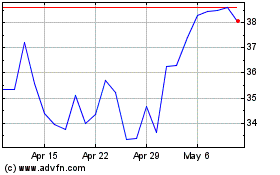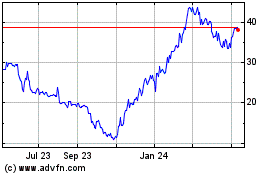Kymera Therapeutics, Inc. (NASDAQ: KYMR), a
clinical-stage biopharmaceutical company advancing a new class of
small molecule medicines using targeted protein degradation (TPD),
today announced that new Phase 1 data for KT-333, a first-in-class
degrader of STAT3, highlighting safety, pharmacokinetics (PK),
pharmacodynamics (PD) and clinical responses will be presented at
the European Hematology Association (EHA) Annual Meeting, taking
place from June 13-16, 2024, in Madrid, Spain. Results released in
an EHA abstract today, which include a data cut-off as of February
6, 2024, demonstrate that KT-333 is a potent and selective STAT3
degrader that has demonstrated clinically significant responses in
specific patient populations. The poster presentation is expected
to include additional data, including PK/PD, safety and results of
disease response assessments from additional patients subsequent to
the abstract cut-off date.
“We’re encouraged by the Phase 1 data generated to date. We have
demonstrated clinically significant responses in specific patient
populations, including cHL and CTCL, at tolerated doses. We have
also achieved substantial target knockdown and pathway activation,”
said Jared Gollob, MD, Chief Medical Officer, Kymera Therapeutics.
“We look forward to completing the Phase 1 study and sharing
additional updates on this first-in-class program across a range of
indications later this year.”
Highlights of the KT-333 Clinical Abstract
The abstract reported Phase 1 data from 39 patients enrolled
through six dose levels (DL) with a mean of 8.7 doses, including
patients with classic Hodgkin’s lymphoma (cHL), B-cell
non-Hodgkin’s lymphoma, cutaneous T-cell lymphoma (CTCL),
peripheral T-cell lymphoma (PTCL), large granular lymphocytic
leukemia (LGL-L), T-cell prolymphocytic leukemia (T-PLL) as well as
solid tumors. Highlights include:
- Two complete responses in two cHL patients at DL4, three
partial responses in CTCL patients at DL2, 4 and 5, and stable
disease in four solid tumor patients at DL3-4.
- KT-333 achieved maximum degradation up to 97.5% in peripheral
blood mononuclear cells at DL1-5 in Cycle 1 with evidence of STAT3
pathway inhibition and downregulation of inflammatory biomarkers in
whole blood. Notably, KT-333 resulted in robust reduction of STAT3,
pSTAT3, and SOCS3 expression in a CTCL tumor biopsy in DL4.
- Induction of an IFN-γ stimulated gene signature predictive of
sensitivity to anti-PD1 was seen in both peripheral blood and
tumor, suggestive of favorable immunomodulatory response in the
tumor microenvironment following KT-333 treatment.
- Dose dependent increases in KT-333 plasma exposure were
observed, achieving levels predicted to be efficacious.
- KT-333 was generally well-tolerated with the most common
adverse events being stomatitis, nausea, ALT increase, constipation
and fatigue. Two dose-limiting toxicities (DLTs) were observed at
DL5 including Grade 3 stomatitis and arthralgia in two separate
LGL-L patients. No DLTs were observed in lymphoma or solid tumor
patients at the time of the cut-off. Grade 3 stomatitis was also
the only KT-333 related serious adverse event.
The Phase 1a trial for KT-333 is currently ongoing. The Company
expects to complete the study and share additional clinical data to
inform the program’s next development steps in 2024 at an upcoming
medical meeting.
Poster Presentation at EHA
Title: Safety, Pharmacokinetics, Pharmacodynamics and Clinical
Activity of KT-333, a Targeted Protein Degrader of STAT3, in
Patients with Relapsed or Refractory Hematologic and Solid Tumor
Cancers Abstract ID Number: P2040Presenter: Aditi Shastri, MD,
Montefiore Medical Center and Albert Einstein College of
Medicine
About KT-333 STAT3 Degrader KT-333 is a potent,
highly selective degrader of STAT3 in development for the treatment
of multiple STAT3-dependent pathologies, including hematological
malignancies and solid tumors. STAT3 is an undrugged transcription
factor activated through a variety of different cytokine and growth
factor receptors via Janus kinases (JAKs), as well as through
oncogenic fusion proteins and mutations in STAT3 itself. In certain
malignant cells, STAT3 activation is set into overdrive, leading to
a dampened immune response, tumor progression, and metastasis.
STAT3’s role as a cancer driver and tumor microenvironment
modulator has been validated in a multitude of studies, making it a
strong candidate to target in the treatment of cancer. KT-333 was
the first degrader against an undrugged transcription factor to
enter the clinic and the Phase 1 clinical trial is designed to
evaluate the safety, tolerability, pharmacokinetics (PK),
pharmacodynamics (PD), and clinical activity of KT-333 dosed weekly
in adult patients with relapsed and/or refractory lymphomas,
leukemias, and solid tumors. Clinical data from the KT-333 Phase 1
trial has shown evidence of STAT3 targeted protein degradation in
humans with associated STAT3 pathway inhibition, along with early
signs of antitumor activity, highlighting the potential of
heterobifunctional degraders for targeting this previously
undruggable transcription factor. The Phase 1a trial for KT-333 is
currently ongoing.
About Kymera TherapeuticsKymera is a
clinical-stage biotechnology company pioneering the field of
targeted protein degradation (TPD) to develop medicines that
address critical health problems and have the potential to
dramatically improve patients’ lives. Kymera is deploying TPD to
address disease targets and pathways inaccessible with conventional
therapeutics. Having advanced the first degrader into the clinic
for immunological diseases, Kymera is focused on delivering oral
small molecule degraders to provide a new generation of convenient,
highly effective therapies for patients with these conditions.
Kymera is also progressing degrader oncology programs that target
undrugged or poorly drugged proteins to create new ways to fight
cancer. Founded in 2016, Kymera has been recognized as one of
Boston’s top workplaces for the past several years. For more
information about our science, pipeline and people, please visit
www.kymeratx.com or follow us on X (previously Twitter) or
LinkedIn.
Cautionary Note Regarding Forward-Looking
StatementsThis press release contains forward-looking
statements within the meaning of the Private Securities Litigation
Reform Act of 1995, as amended, including, without limitation,
implied and express statements by Kymera Therapeutics regarding
its: strategy, business plans and objectives for its clinical
programs; plans and timelines for the preclinical and clinical
development of its product candidates, including the therapeutic
potential, clinical benefits and safety thereof; expectations
regarding timing, success and data announcements of current ongoing
preclinical and clinical trials; the ability to initiate new
clinical programs; and Kymera's financial condition and expected
cash runway into the first half of 2027. The words "may," "might,"
"will," "could," "would," "should," "expect," "plan," "anticipate,"
"intend," "believe," "expect," "estimate," "seek," "predict,"
"future," "project," "potential," "continue," "target" and similar
words or expressions are intended to identify forward-looking
statements, although not all forward-looking statements contain
these identifying words. Any forward-looking statements in this
press release are based on management's current expectations and
beliefs and are subject to a number of risks, uncertainties and
important factors that may cause actual events or results to differ
materially from those expressed or implied by any forward-looking
statements contained in this press release, including, without
limitation, risks associated with: the timing and anticipated
results of our current and future preclinical studies and clinical
trials, supply chain, strategy and future operations; the delay of
any current and future preclinical studies or clinical trials or
the development of Kymera Therapeutics' drug candidates; the risk
that the results of current preclinical studies and clinical trials
may not be predictive of future results in connection with current
or future preclinical and clinical trials, including for KT-333;
Kymera Therapeutics' ability to successfully demonstrate the safety
and efficacy of its drug candidates; the timing and outcome of the
Kymera Therapeutics' planned interactions with regulatory
authorities; obtaining, maintaining and protecting its intellectual
property; the risks associated with pandemics or epidemics; and
Kymera Therapeutics' relationships with its existing and future
collaboration partners. These and other risks and uncertainties are
described in greater detail in the section entitled "Risk Factors"
in the Annual Report on Form 10-K for the period ended December 31,
2023, as well as discussions of potential risks, uncertainties, and
other important factors in Kymera Therapeutics' subsequent filings
with the Securities and Exchange Commission. In addition, any
forward-looking statements represent Kymera Therapeutics' views
only as of today and should not be relied upon as representing its
views as of any subsequent date. Kymera Therapeutics explicitly
disclaims any obligation to update any forward-looking statements.
No representations or warranties (expressed or implied) are made
about the accuracy of any such forward-looking statements.
| Investor and Media
Contact: Justine KoenigsbergVice President, Investor
Relationsinvestors@kymeratx.commedia@kymeratx.com
857-285-5300 |
Kymera Therapeutics (NASDAQ:KYMR)
Historical Stock Chart
From Dec 2024 to Jan 2025

Kymera Therapeutics (NASDAQ:KYMR)
Historical Stock Chart
From Jan 2024 to Jan 2025
